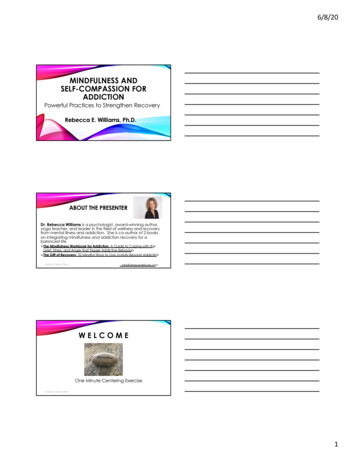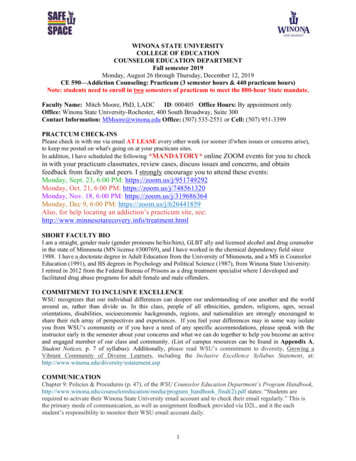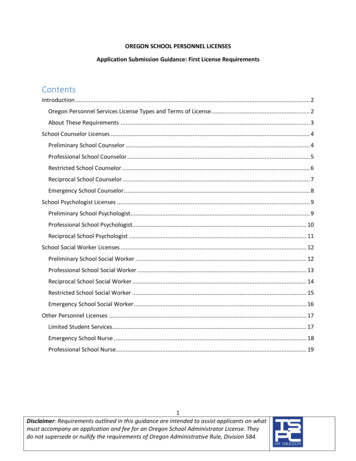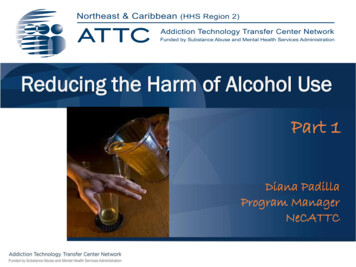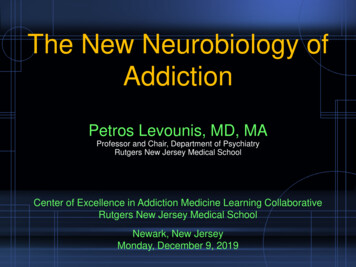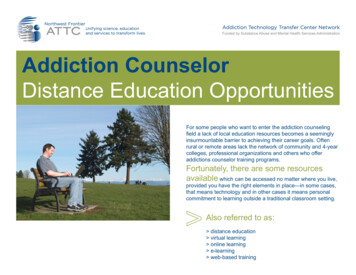
Transcription
Addiction CounselorDistance Education OpportunitiesFor some people who want to enter the addiction counselingfield a lack of local education resources becomes a seeminglyinsurmountable barrier to achieving their career goals. Oftenrural or remote areas lack the network of community and 4-yearcolleges, professional organizations and others who offeraddictions counselor training programs.Fortunately, there are some resourcesavailable which can be accessed no matter where you live,provided you have the right elements in place—in some cases,that means technology and in other cases it means personalcommitment to learning outside a traditional classroom setting.Also referred to as: distance education virtual learning online learning e-learning web-based training
In this Guide:Intro.3Overview.1.2.3.4.Does distance learning work?.4What types of distance learning opportunities are available?.5What are the pros and cons and typical requirements of each type?.5What kinds of technology or equipment do I need?.8Tips for Success.5. How do I know if distance learning is a good fit for me?.96. How can I set myself up to succeed with distance learning?. 117. What should I look for in selecting a distance learning course or program?.14Current Courses.8. What addiction education distance learning courses are currently available?.19Resources.9. What other resources should I know about?.292
Intro:Distance learningisn’t for everyone.Peoplewho are most successful with it tendto be self-motivated, skilled withscheduling their time, and capable ofmeeting deadlines. Advanced readingand writing skills are often required toexcel in text-heavy distance educationcourses.On the positive side,distance education offers flexibilityfor people who have work or familyresponsibilities outside of school.Often, students enrolled in onlineeducation programs are able to workat their own pace, accelerating theirstudies if desired. Distance educationalso helps meet the needs of peoplewho live in rural or remote areas.However, students involved in distanceeducation often complain that theymiss the direct, face-to-face interactionfound on traditional campuses. Sincecoursework is generally self-directed, itis difficult for some distance educationstudents to stay engaged and completetheir assignments on time.3introThis guide is intended to helpWith all that in mind, this guide is intended to help a potential distance learner in the NFATTC region(Alaska, Hawaii, Oregon, Washington and the Pacific Jurisdictions) answer the following questions: OVERVIEW: Does distance learning work? What types of distance learning opportunities areavailable? What are the pros and cons and typical requirements of each type? What kinds oftechnology or equipment do I need? TIPS FOR SUCCESS: How do I know if distance learning is a good fit for me? How can I setmyself up to succeed with distance learning? What should I look for in selecting a distancelearning course or program? CURRENT COURSES: What addiction education distance learning courses are currentlyavailable? RESOURCES: What other resources should I know about?
Overview:1. Does distance learning work?Most of the primary studies done on this question (many of which wereconducted when distance education became more prominent in the late80’s – 90’s) conclude that distance education compares favorably withclassroom-based instruction. In fact, Fox (1998) stated he found noactual evidence from a single study, from distance education teachingexperiences, or from students has provided proof that distance learningis less effective than classroom-based instruction.With few exceptions, students using technology in distance educationhave similar learning outcomes to students in the traditional classroomsetting (Beare 1989; McCleary & Egan 1989; Sonner 1999). Souder(1993) conducted a natural experiment that compared traditionalstudents and distance education students in management of technologymaster’s degree programs. Distance learners can perform as well as orbetter than traditional learners as measured by homework assignments,exams, and term papers. Equally important, as noted by researchers,is the fact that students in distance learning courses earned highergrades than those in the traditional classroom setting (Bartlett 1997;Bothun 1998; Heines & Hulse 1996; Kabat & Friedel 1990; Schutte1996; Souder 1993). Gubernick and Ebeling (1997) stated thatdistance education students scored from five to ten percent higheron standardized achievement tests than did students in the traditionalclassroom setting. Conversely, as reported by other researchers,there are no significant differences in grades for distance educationstudents versus traditional students (Freeman 1995; Mortensen 1995;McKissack 1997).4overviewBartlett, T. (1997). The hottest campus on the Internet. Business Week, 3549, 77-80.Beare, P. L. (1989). The comparative effectivenessof videotape, audiotape, and telecture. The American Journal of Distance Education 3(2), 57-66.Bothun, G. D. (1998). Distance education: Effectivelearning or content-free credits? Cause/Effect, 21(2),28-31, 36-37.Fox, J. (1998). Distance Education: is it goodenough? The University Concourse, 3(4), 3-5.Freeman, V. S. (1995). Delivery methods, learningstyles and outcomes for distance medical technology students. (Doctoral Dissertation, University ofNebraska-Lincoln, 1993).Gubernick, L., & Ebeling, A. (1997). I got my degreethrough e-mail. Forbes, 159(12), 84-92.Heines, R. A., & Hulse, D. B. (1996). Two-way interactive television: An emerging technology for university level business school instruction. Journal ofEducation for Business, 71(2), 74-76.Kabat, E. J., & Friedel, J. (1990). The development,pilot-testing, and dissemination of a comprehensiveevaluation model for assessing the effectiveness of atwo-way interactive distance learning system. ERIC,ED 322690.McCleary, I.D., & Egan, M. W. (1989). Program design and evaluation: Two-way interactive television.The American Journal of Distance Education, 3(1),50-60.McKissack, C. E. (1997). A comparative study ofgrade point average (GPA) between the students intraditional classroom setting and the distance learning classroom setting in selected colleges and universities. (Doctoral Dissertation, Tennessee StateUniversity, 1997).Mortensen, M. H. (1995). An assessment of learning outcomes of students taught a competencybased computer course in an electronically-expanded classroom (distance education). (DoctoralDissertation, University of North Texas, 1995).Phipps, R., & Merisotis, J. (1999). What’s the Difference? A review of contemporary research on theeffectiveness of distance learning in higher education. Washington: THE INSTITUTE for Higher Education Policy.Schutte, J. G. (1996). Virtual teaching in highereducation: The new intellectual superhighway orjust another traffic jam? Retrieved July 7, 2001 r, B. (1999). Success in the capstone business course—assessing the effectiveness of distance learning. Journal of Education for Business.74(4), 243-248.Souder, W. E. (1993). The effectiveness of traditional vs. satellite delivery in three management oftechnology master’s degree programs. The American Journal of Distance Education, 7(1), 1993.
2. What types of distance learningopportunities are available?To start with the “big picture”, below is a quick overview of this rapidly developing and changing field. The grid below analyzes the most common options currently available. Section VIprovides links to actual courses that are currently being offered in NFATTC’s region.3. What are the pros and cons and typical requirements of each type?TYPEREQUIREMENTSPROSCONSEXAMPLEONLINE* COLLEGECOURSES:Internet access(dial-up is not workable dueto how slow it is)AccreditedCan be expensiveGenerally many supportiveresources for the learner:library, student advising,technical assistanceMay require collegeregistrationCommunity or 4-yearcourses towards adegree or certification inaddictions counselingbecoming very common asa supplement to inpersoncoursework; entire degreesmay be offered onlineComputerPhoneTuitionSelf motivation anddisciplineAbility to read at collegelevelModerate degree ofcomputer literacy (dependson the course and theinstitution offering it)Ability to meet at scheduledtimes for synchronous*courses5overviewCredits generally transferwellWell-established entitiesthat are not going todisappear or close up shopProfessional commitment tothe field and studentsCourses may not be offeredas frequently as needed
TYPEREQUIREMENTSPROSCONSEXAMPLEOnline* coursesoffered byprivatecompanies:(Same as above)Topics covered may beresponsive to newer trendsand issues in treatmentMay not be accreditedCurrent or formercounselor who sets up acompany and providesaddiction counselortraining coursesSome leaders in the field goon to offer classes so canbe a way to connect with ahigher level of expertise insome casestypically not part of acomprehensive curriculumtowards a degree, such ascolleges offer;More difficult to determinequality of classCan be expensiveInstructor may focus on theirown techniques rather thanevidence-based onesLess secure as a resource(some go out of business)Usually few or no additionalresources and technicalsupportPuts more onus on buyer toresearch the companyOnline* coursesoffered bygovernmentagencies(federal, state, local):(Same as above)Courses tend to beaccurate, reputable, solidMay be difficult to find-many government entitieslack budget and technicalexpertise to offer onlinecoursesATTC courses;courses offered by StateAddictions Div.typically single offerings ona particular topic* There are two types of online courses: synchronous and asynchronous. Students taking online education courses synchronously are required to log on to their courses at the same time as their professors and peers.Students taking online education courses asynchronously may log on to the course website whenever they choose and do not have to participate in discussions or lectures at the same time as their peers.“Hybrid” courses:some sessions online* andsome in person at a facility(Same as above), plusmeans of transportation andschedule that allows for timeto attend inperson sessionsOnline sessions areconvenient and inpersonsessions offer opportunitiesto bond with and discusstopics with instructor andfellow studentsStudent must be able totravel to the classroom forthe designated session(s)6overviewDepending on locationof inperson meetings,transportation may be anissueMainly offered by 2- and4- year colleges
TYPEREQUIREMENTSPROSCONSEXAMPLEVideo courses:broadcasts typicallysponsored by collegesSelf motivation anddisciplineMay be easier tounderstand for participantswith lower reading levelcapabilitiesParticipant needs toresearch the provider;cable-based shows can beof questionable reputationMainly offered by 2- and4- year collegesSome cable stations mayalso broadcast coursesdeveloped by individualsTV set or computer withhigh speed internet accessDepending on the type ofbroadcast, may be one-waycommunication so questionsdifficult to get answeredCorrespondencecourses:now much less commondue to availability ofinternet-based courses;typically use writtenassignments or workbooksubmitted for grading/feedbackSelf motivation anddisciplineRequires little or notechnology/tech savvyAbility to send and receivepackages by mailParticipant must be able toread at level of materialsprovidedPublication-based:offering CEUs for readingand submitting writtenresponses to quiz questionsSubscription (in somecases)Ability to read at the level ofthe publicationRequires little or notechnology (unless ane-publication which requiresinternet and computer)Topics can be very timelyand responsive to currentneeds and trendsComputer with internetaccessPhoneEmail7overviewAlaska’s RADACT trainingprogramOne-way communication soquestions may not be easilyansweredAddiction Messengeroffers CEUs forresponding to articlesEasy to review materialRelatively easy andconvenientWebinars:typically single event topicalsessionsDifficult to find now thatinternet-based courses areavailableConvenientCan be responsive toimmediate needs andprovide “hot” topic typetrainingVery limited no. of CEUSare available this wayOffers least possibility fortwo-way communicaitonso not appropriate forskills-based training butacceptable for increasingknowledge of some topicsCan be set up andsponsored by almostanyone, so participant mustresearch the providerMay or may not offer CEUsSessions noted instate agencies’ trainingcalendars
3. What kind of technologyor equipment will I need?Distance education providers will list thespecific technology needed to participate intheir courses, so you should start with theprovider’s website and if you don’t find therequirements specified there, give them acall. In general, you will need: High speed internet access—if you areon a slow or dated system, such asdial-up, you probably won’t be able tonavigate distance ed. courses quicklyenough to make it work for you. A computer with sufficient memory andcapacity to handle large and complexfiles, do downloads, handle videos, etc.Below is a sample set of requirements taken from one college’s website—they are provided hereto illustrate the kind of information you should obtain from the distance ed. organization so you canbe sure you have what it takes, technologically speaking, to participate:SAMPLE: Computer System Requirements1. Operating Systems: Windows XP; Windows Vista; Macintosh OSX2. Processor and RAM: Minimum 1 Ghz processor; Minimum 1 GB RAM; Windows Vistarequires a minimum of 2 GB of RAM to run effectively3. Internet Access: High-speed Internet access is required: DSL, cable, or high-speed wireless;a 56K dial-up connection is insufficient for accessing online courses4. Recommended Browsers:Windows: Internet Explorer 7; Firefox 2.0 or 3.5; Safari 4.0Macintosh: Safari 4.0; Firefox 3.55. Miscellaneous: Current Java Runtime Environment8overview
Tips for Success:5. How do I know ifdistance learning isa good fit for me?Taking classes or even earning a degree online can be an enjoyableand rewarding experience. But, distance education is not for everyone.Depending on your career goals, distance education opportunities maybe challenging to find. While some people thrive on the independenceand freedom offered through such classes, others do not fare as well.Characteristics of successfuldistance learnersSuccessful distance learners have a few characteristics in common.9tips for success
Compare yourself to the following list to determine whether ornot online classes are a good fit for your personality and habits.SELF MOTIVATEDSuccessful distance learners do just as well, if notbetter, without peoplelooking over their shoulders. While some peopleneed teachers to keepthem motivated and ontask, distance learnersare able to motivatethemselves. They realize that they will neverbe face-to-face with thepeople who give themassignments and gradetheir work, but they don’tneed others to encouragethem. The most successful students are self-motivated and set their owngoals.10 tips for successLOVE TO READSuccessful distance learners have goodreading comprehension skills. While mostpeople learn by listening to lectures andtaking notes, the majority of distancelearners are expected to master materialthrough reading alone. Although somedistance learning courses offer video recordings and audio clips, most programsrequire that students understand a largeamount of information that is only available through written text. These studentsare able to comprehend texts at the college level without the direct guidance of ateacher.PACE THEMSELVESSuccessful distance learners are not procrastinators. These students enjoy thefreedom of working at their own pace andappreciate the ability to complete their workin as much time as it takes them, instead ofwaiting for an entire class. However, they understand that putting off their work too oftencan end up adding months, if not years, totheir studies.OTHER SOCIAL OUTLETSSuccessful distance learnersfeel alright about missing thesocial elements of traditionalschools. Whether they’re mature adult learners or youngerstudents who get their socialization from extracurricularactivities elsewhere, they arecomfortable with their current social situation. In placeof classroom discussion, theyexplore the issues with theirpeers through email and message boards or discuss whatthey’re learning with spousesor coworkers.ABILITY TO FOCUSSuccessful distance learners can resist constantdistractions. Successful studentaletting the machinepick up the phone when they know there is work to bedone.
6. How can I set myself up to succeed?Time ManagementTime management may be the biggest factor in succeeding withdistance learning. Successful distance learners have to be proactive intheir studies and take responsibility for their own learning.To master time management, first determine what time of day you thinkyou will be most focused on your studies. Are you a morning person or anight owl? Do you concentrate best after a cup of coffee or after lunch?Once you narrow in on a time of day reserve a designated allotment oftime to dedicate to your course. Stay committed to that reserved timeand treat it like an appointment that can’t be budged.Studies of people who havedone well with distancelearning reveal the followingtips for success:Balancing Personal ObligationsWhile there are many reasons to take an online course – one of themost frequent reasons students choose these courses is because ofthe convenience. Whether you have a full-time job, don’t want to fighttraffic or are raising a family – balancing school and personal obligationscan become a juggling act.The beauty of self-paced, online courses (otherwise known as“asynchronous” courses) is that you can study around your schedule.Other online courses may require that you log in at the same time asthe professor and/or other classmates (these are called “synchronous”courses), so those courses may require a bit more adjustment on yourpart so you can participate at the designated time.11 tips for success
Study EnvironmentAn ideal study environment can vary from student to student. Somestudents need absolute silence while others can’t seem to concentratewithout noise in the background. No matter what your preference is,a well-lit place that is free from distractions is recommended. Notethat you’ll make much better use of thirty minutes of disruption-freestudy than an hour’s worth of commotion-filled learning. If you can’tescape in-home interruptions, try the library or a coffee shop. Scheduleyour designated study time when you can be in a distraction-freeenvironment and your chances for success will increase; below are afew sample “work rules” to consider—make a list that works for you andshare it with those you live with: “Work time is between the hours of 7 and 11 a.m. I won’t plan anythingelse during that time.” “The ringer on the phone or cell phone is always turned off while I’mworking.” “When I put a sign on the door, family members and friends shouldknow that I’m working and not disturb me.” “I will take one big break in the middle of my work, but will stop takinglots of small breaks throughout the morning.”QuestionsAs an online student there are several ways to get the answers youare seeking. If your course offers instructor support (recommended),you can always direct inquiries to your teacher. Top-notch courses tendto provide first-class support so that students never feel lost or aloneduring the e-learning process.However, online chat rooms, if provided, are another great resource forstudents seeking answers. Online chat rooms give students a forumto meet other students taking the same course and ask questionsor discuss assignments. More than likely another student taking thecourse has had or will have the same question.Get What You GiveRemember that distance learning courses are designed to provide theskills necessary to acquire professional caliber positions for in-demandoccupations. The more effort you put forth in these online courses tocomprehend the lessons taught the more likely you are to succeed afterthe course is finished. Extra effort during the course will lead to aneasier transition in your new positions or with your new responsibilities.Overall, e-learning has a lot to offer students who dedicate the time andfocus to extracting everything the course has to offer.12 tips for success
ConnectConnect with your classmates. Making an effort to actually get to knowyour classmates can be rewarding. If you find students from your area,consider a physical study group at an appropriate meeting place. Ifnot, try to create an online support group of peers. They’ll appreciatehaving someone to keep them on track in their work and you’ll reap thebenefits of being accountable as well. DiscussStaying MotivatedDiscuss what you learn. Find a friend or relative who has similar interestsor who would enjoy hearing about your studies and let them knowwhat’s going on in your classes. You’ll understand the material betterwhen you have a chance to explain it out loud and will be motivated tostay on task in order to keep up with the conversation.Many distance learners agree that the most difficult part of studyingonline is staying motivated. Because students must take the initiativeto complete their courses completely on their own, without the physicalpresence of teachers and other peers, many students find it easy tobecome distracted and discouraged in their work. Don’t let this happento you – use these four motivational tips to stay on task:Consider charting your progress. Don’t rely on solely on campuscounselors; design your own map of completed classes and postit somewhere that is visible daily. There’s a certain satisfaction fromwatching your goals come to life. Track BalanceTake time for fun. If you’re spending all your time working, studying, andwatching after the kids, you’ll likely suffer in all areas. Everyone needssome down time to re-group. So, set aside a little time every week fora favorite activity. You’ll be more productive when you return to yourwork.13 tips for success
7. What should I look for in evaluatingdistance ed courses?It’s incumbent upon you as a potential distance learner to be surethe course(s) you are taking are offered by reputable sourcesand for approved credits or CEUs that will help you advance.Your career goals MatterA key consideration regarding distance education should be your career goals, as illustrated by the grid below:CAREER GOALNEEDS & OPTIONSPerson wanting to become a certifiedaddiction counselorYou will need to take the basic required courses from a 2- or 4-year college, plus complete a practicum and supervised experience. While some basic courses can probably be taken online, you probably won’t be able to piecetogether a significant portion of your coursework via distance education—your education will also need to occur inthe classroom setting and in worksite settings for practicum, internship and supervised experience requirements.Courses that you take for CEUs, as opposed to college credits, may or may not count towards your degree andshould be verified with your advisor.Person in related field wanting to learnmore about addiction counseling butnot seeking certificationDepending on the related field you are in, you may have already completed some of the requirements and mayfind a good portion of coursework you need to complete is available online. CEU or college-credit offerings mayboth meet your needs.Person in related field wanting tobecome certified addiction counselorDepending on the related field you are in, you may have already completed some of the requirements and mayfind a good portion of coursework you need to complete is available online. CEU or college-credit offerings mayboth meet your needs, except for practicum/internship and supervised field experience, but that should be verifiedahead of time.Person currently working as counselorneeding to keep certification up-to-dateIf you are a practicing counselor who is looking for continuing education credits in order to keep your certificationup to date, distance education will offer you some good options and may be a primary format for your needs.14 tips for success
Before committing, get answersBefore committing to any distance learningprogram find out the answers to thefollowing questions. It’s important to bethorough in your investigation of differentdistance learning opportunities—use thequality checklist at the end of this section tohelp you make an assessment—each itembelow gives you specific ways to find theanswers to the questions posed. If the course(s) is offered by anentity other than a college, arethe CEUs or credits approved bythe state accrediting body?If not, they may not count towards your certification requirements so be sure to check that outfirst. Most training or education program vendors will advertise how many CEUs or creditsare provided and by which accediting bodies.TIP:The national and state accreditingbodies are listed in the Resource section ofthis Guide—check the links or contact themfor more information on the requirements forbecoming a certified addictions counselor andif you have questions about whether a courseor program will meet those requirements.15 tips for success
If the course(s) is offered by a school, is theschool accredited?This is the single most important question to ask. There are six regionalaccrediting agencies that complete a thorough evaluation of the qualityof education delivered at each college or university.Why is college accreditation important?Here’s why:College accreditation gives the assurance that, as a distance learner, you will be able to attain the same educational outcomes asyou would in a traditional classroom-based program.College accreditation entitles you to the same rights to admissions,orientation, registration, counseling, tutoring, placement, financialaid, and other student services that are available to all other collegestudents, regardless of the delivery method of your classes.Without accreditation by a nationally recognized accrediting organization, a school is not eligible to participate in government studentassistance programs. This means that, as a student, you would notbe eligible for federal grant or loan money.Most employers who offer tuition assistance will not reimburse yourtuition if you attend a school that is not accredited.If you intend to transfer credits from one school to another, you willlikely only be able to do so if you attended an accredited college oruniversity.TIP:The colleges listed on the ATTC Network’s Directory ofAddiction Studies Programs (DASP) are accredited; go to http://nattc.org/dasp/stateprog/choosestate.asp.16 tips for success How many years has the organization beenoffering courses online?For any organization that offersonline classes, there is a naturaltrial-and-error process involved.The longer the organization hasbeen offering online classes, thegreater confidence you can havethat the technical and logisticalchallenges of putting a class online have already been workedout and refined. What’s the instructor-to-student ratio in theprogram you are interested in?Keeping this ratio within the 1 to10 ratio is best for online learning,especially if you are interested ingetting a graduate degree online. When this ratio gets over 30,there is little, if any, time for theinstructor to spend developingand in-depth relationship with individual students. For many programs, a 1 to 20 ratio is averageand allows time for instructors towork with students individually.Many distance learning collegesstrive for this goal.
What is the refund policy in the event thatyou have to drop a class?Schedules change quickly, andif you are working full time andare a parent, your time is alreadytight. If your job workload increases or requires travel, it may notbe possible for you to finish anonline class. Be clear of the refund policy before you sign up forany online education program. What is the Program’s Reputation?The reputation of the distance learning program you attend may hinderor enhance your post-graduate employment prospects. In evaluatingthe reputation of a distance learning program, you should not solelyrely on the program’s website or marketing materials. Other ways toinvestigate the reputation of a distance learning program include: Talking to others who have participated in the course/program. Researching the program’s record with the Better Business Bureauto see if any complaints have been made. Talking to existing counselors and ot
master's degree programs. Distance learners can perform as well as or better than traditional learners as measured by homework assignments, exams, and term papers. Equally important, as noted by researchers, is the fact that students in distance learning courses earned higher grades than those in the traditional classroom setting (Bartlett 1997;

